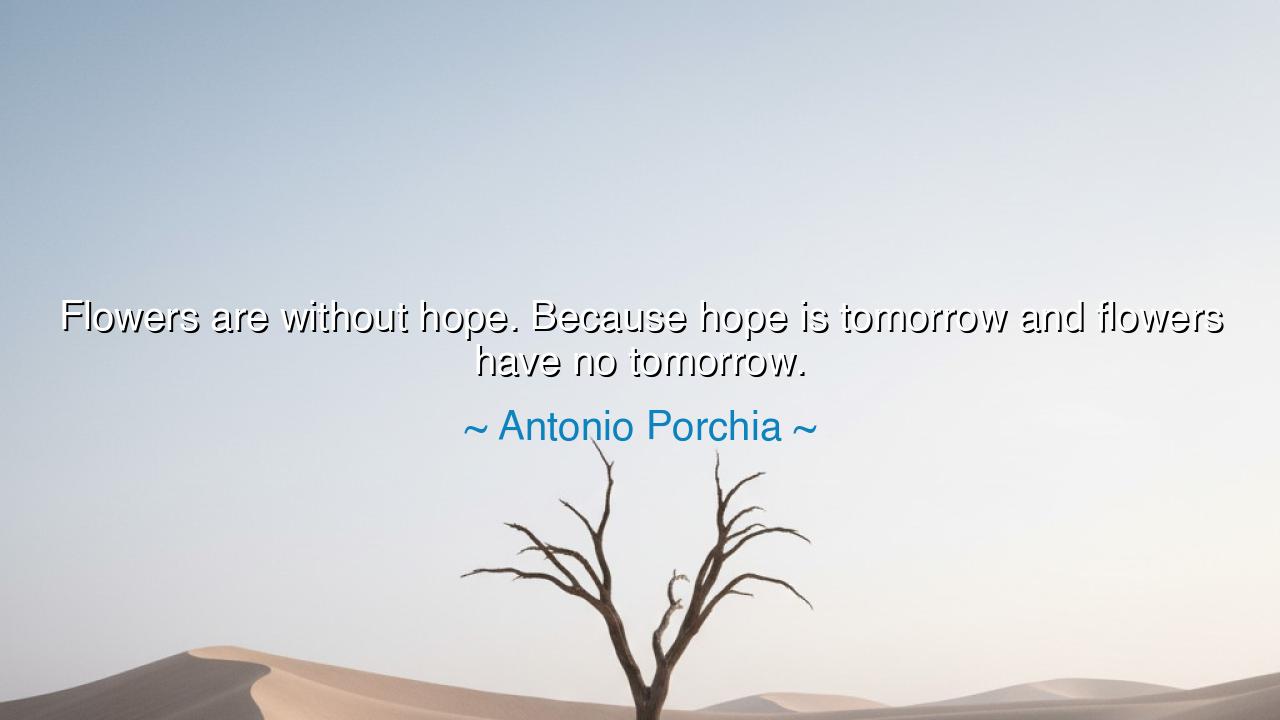
Flowers are without hope. Because hope is tomorrow and flowers






Antonio Porchia once wrote: “Flowers are without hope. Because hope is tomorrow and flowers have no tomorrow.” In this short, piercing line, we find the essence of life’s fragility and the contrast between the human condition and the fleeting beauty of nature. The flower blooms in the moment, radiant and whole, but it does not dream of a future, nor does it fear the coming of night. Man, however, is chained to hope, for he imagines tomorrow and longs for what is not yet. Thus Porchia shows us both the blessing and the burden of humanity: we are creatures of hope, but the flower is a creature of presence.
The origin of this thought is found in Porchia’s collection Voices, a book of aphorisms born from loss, hardship, and profound reflection. An Argentine poet of Italian descent, he lived a simple and humble life, yet from his pen came words of timeless weight. He looked at flowers—symbols of beauty and impermanence—and saw in them the freedom from longing. They are complete in their day, in their bloom, in their color. They do not reach toward tomorrow. Humanity, on the other hand, is never content with the present, always stretching toward what is not yet, carrying the burden of hope.
The ancients also pondered this divide. The Stoics spoke of living according to nature, of accepting each day as sufficient unto itself. Marcus Aurelius wrote that man must learn to live as though each day were his last, for in truth it may be. The flower, by its very existence, embodies this wisdom without effort. It does not grasp at tomorrow, it does not postpone its fragrance or hold back its bloom. In its brief life, it is whole. But man, ever hoping, often fails to live fully in the present moment.
History offers us examples of both extremes. Consider Anne Frank, writing her diary in the midst of terror. She wrote of hope, even when tomorrow was uncertain, even when every hour might bring death. That hope sustained her spirit, though her life was cut short. In her, we see the human distinction from the flower: the power to project into the unknown, to endure through imagination. And yet, the flower teaches us a counter-lesson: that to live fully, we must not abandon today in the pursuit of tomorrow. The union of the two—hope and presence—makes life whole.
Porchia’s words may sound sorrowful, yet they hold a hidden beauty. To say that flowers have no hope is to say that they have no need of it. Their purpose is fulfilled in their moment. They bloom, they wither, they return to the soil, and their life is complete. For man, the challenge is different: to hope without forgetting the bloom of today, to look toward tomorrow while living in the fullness of now. The flower does not envy us our hope, nor should we envy it its freedom. Instead, we are called to learn.
The lesson is clear: do not lose yourself entirely in hope. Do not postpone your life, always waiting for tomorrow. Breathe in the fragrance of the flower and learn from it to live in the moment. But neither should you abandon hope, for it is the fire that carries humanity through darkness. The wisdom lies in balance: let hope guide you, but let presence fill you. Live as though the flower, radiant in today, yet carry within the heart the strength of hope for tomorrow.
Practically, this means cultivating both gratitude and vision. Each morning, look upon life as the flower does—complete in its bloom. Do not say, “I will live when I achieve this, or when tomorrow arrives,” but say instead, “I live now, and I am whole in this moment.” And yet, keep the ember of hope alive, for it gives direction and endurance. In this union, man transcends despair, and he learns to honor both the fleeting beauty of the present and the eternal call of the future.
Thus Porchia’s words endure as both a challenge and a comfort: “Flowers are without hope. Because hope is tomorrow and flowers have no tomorrow.” May we learn from the flower to live today, and from hope to endure tomorrow. For only in this balance do we become fully human, and fully alive.






AAdministratorAdministrator
Welcome, honored guests. Please leave a comment, we will respond soon